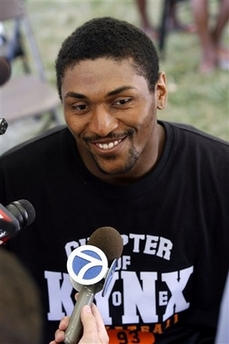DETROIT - Ron Artest, talking to children as part of his community service
sentence, defended his actions in one of the worst brawls in U.S. sports
history.

Ron Artest questions
from the media following the Real Brothers Empowerment Forum at the Mathis
Community Center in Detroit, Wednesday, Aug. 16, 2006. Artest talked about
his actions in one of the worst brawls in U.S. sports history which took
place in November 2004 at a Detroit Pistons game. He is scheduled to
perform community service in the Detroit area through Sunday.
[AP] |
"Someone started trouble and I ended it," Artest told about 50 children
Wednesday at a panel on black empowerment at the Judge Mathis Community Center.
"I would always encourage you to protect yourself but in certain situations, if
you can avoid them, avoid them."
Artest was at the center of the November 2004 brawl at a Detroit Pistons
game. It started when Artest, then with the Indiana Pacers, fouled Pistons
center Ben Wallace late in a blowout game.
As the confrontation on the court appeared to calm down, a fan hit Artest,
who was lying on the scorer's table, with a cup. Artest charged into the stands
and threw punches, along with teammate Stephen Jackson.
Pistons fan John Green was convicted of punching Artest but was found not
guilty of throwing a drink on the player.
"I like John Green, he's real." Artest said. "I don't have any problems with
John Green. He did something really stupid but a lot of people do stupid things.
God forgives, so I'm forgiving too."
But Artest, who plays for the Sacramento Kings, said he really doesn't think
about that night in The Palace of Auburn Hills.
"It's so over. That night has been so far over, I really don't have any
thoughts on it."
Oakland County Prosecutor David Gorcyca, whose office investigated the brawl,
said Artest set a bad example for the children that night.
"Sometimes you have to be a bigger man," Gorcyca said. "If somebody spits in
your face or throws some water or beer on you, it doesn't give you the license
to attack the person with more degree of force than necessary."
Gorcyca said whether he cares to realize it or not, Artest is a public figure
that children look up to, which comes with being a mentor or role model.
"Children idolize professional athletes," Gorcyca said. "They want to imitate
their clothing, their behavior, their jewelry. So they have to hold themselves
up to a higher threshold."
Artest, Jackson and several teammates were sentenced to one year of probation
and 60 hours of community service after pleading no contest to misdemeanor
assault charges. Artest is scheduled to complete half of his community service
in the Detroit area through Sunday.
Artest also spoke about his upbringing in a broken home and how past drug
dealing almost landed him in jail. He said he started getting into trouble after
his parents divorced when he was 13.
"I was very sad and I always wished they got back together, but they're not,"
Artest said. "If that happens to anybody, you have to worry about yourself. You
can't worry about your parents at that time, because obviously they aren't
thinking about you, they're thinking about themselves."